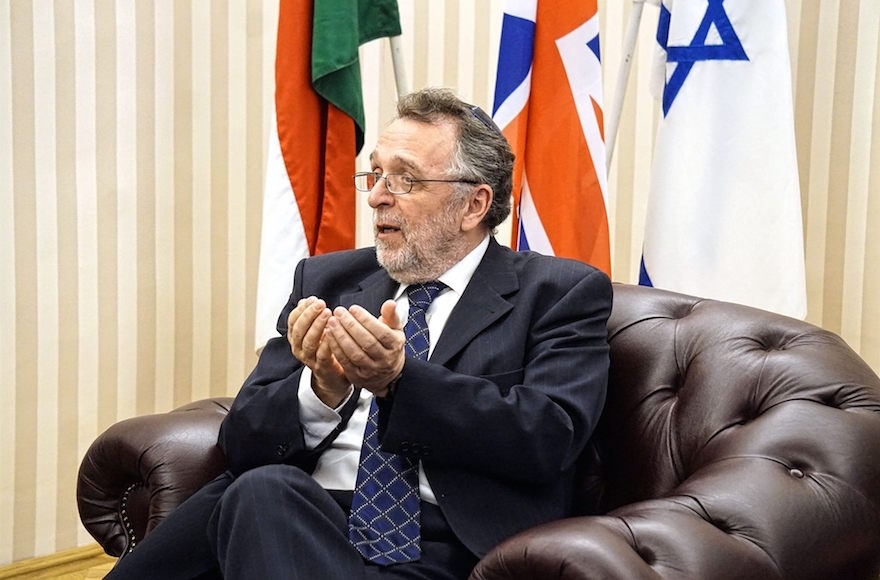Hungarian Jewish leader urges Netanyahu to condemn anti-Semitism during visit
Published July 17, 2017

András Heisler, who heads the umbrella Jewish group in Hungary, said his community is excited about the meetings between Israeli and Hungarian leaders. (Courtesy of Mazsihisz)
BUDAPEST (JTA) — A top Jewish official in Hungary is seeking a strong condemnation of anti-Semitism in the country from Prime Minister Benjamin Netanyahu as the Israeli leader arrived Monday for a four-day visit there.
ADVERTISEMENT
“It is most important for the Hungarian Jewish community that the Israeli prime minister condemns strongly any kind of hate campaign or hate speech during his visit to Hungary, and it is also very important that Netanyahu should stress the importance of the Diaspora, including the Hungarian Jewish Diaspora,” András Heisler, the president of Mazsihisz, the umbrella group of Hungarian Jewish communities, told JTA on Monday.
Netanyahu is visiting Hungary in the wake of a government-led campaign aimed at discrediting the pro-refugee polices of the Hungarian-Jewish philanthropist George Soros. The goal of the trip is to shore up bilateral trade between Hungary and Israel, which exceeds $500 million.
Some called for Netanyahu to cancel the visit over the anti-Soros campaign and after Prime Minister Viktor Orban praised Hungary’s World War II-era anti-Semitic leader, Miklós Horthy.
Mazsihisz criticized the anti-Soros campaign, saying it could and did incite anti-Semitism. Israel’s ambassador to Hungary also criticized the campaign, although the Israeli government later clarified that while it reviled anti-Semitism, it remained at odds with Soros, a frequent critic of its policies.
ADVERTISEMENT
Heisler acknowledged Israel’s differences with Soros, who funds the activities of various Israeli human rights groups critical of the Israeli government. Still, he called the anti-Soros campaign “a very dangerous game.”
“Soros’ name has a different meaning in Hungary and in Israel,” he said. “In Hungary, Soros is the symbol of the Jewish capitalist. The campaign against Soros in Hungary incited anti-Semitic reactions.
“When the campaign against Soros started here, the anti-Semitic graffiti were painted immediately upon the posters, and an anti-Semitic act followed against one of our Jewish communities, and also an intolerable tone was spreading in the state-owned media.”
Earlier this month, Heisler signed an open letter to Orban seeking the removal of posters mocking Soros and asking him to end the campaign. Mazsihisz took credit when the government announced it would end the campaign and take down the posters, although the government claimed the campaign was ending as originally scheduled.
“I am glad because what we as the leader of the Jewish community asked — that is to halt the campaign — was fulfilled by the government, although unfortunately there are still posters unremoved all over the country,” said Heisler, referring to the end of the campaign. “We are less interested in the reason for why the Hungarian government started and halted the hate campaign against Soros. There are several explanations for that. We are looking forward and excited about the coming meetings between the Hungarian and Israeli leaders.”
On Tuesday, Orban will welcome Netanyahu at the parliament in Budapest. That afternoon, Netanyahu will lay a wreath at the Monument to the Hungarian Unknown Soldier and meet with Hungary’s president, János Áder.
On Wednesday, Netanyahu will meet with leaders from Hungary, Poland, Slovakia and the Czech Republic and attend a Hungarian-Israeli business forum. That evening, he and Orban will visit the Dohány/Tabac Street Synagogue in Budapest, the largest 19th-century synagogue in Eastern and Central Europe. Netanyahu also will meet with Jewish leaders at Mazsihisz headquarters on Síp Street, behind the synagogue.
Netanyahu will return home on Thursday afternoon.
“It was unacceptable for us that the Jews were afraid due to the hate campaign and to the hate speech,” Heisler said. “No leader of any Jewish community can tolerate when Jews fear from the consequences of the hate campaign of the government.”














